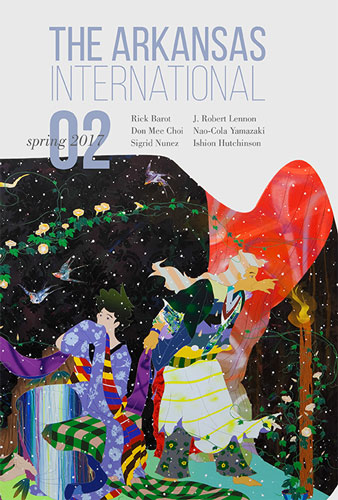The Arkansas International – Spring 2017
The second issue of The Arkansas International contains an impressive range of eclectic writing. But what caught my eye first was the collection of six-panel comics excerpt from the Notes Mésopotamiennes by French comic book writer François Ayroles, translated by Edward Gauvin.
The second issue of The Arkansas International contains an impressive range of eclectic writing. But what caught my eye first was the collection of six-panel comics excerpt from the Notes Mésopotamiennes by French comic book writer François Ayroles, translated by Edward Gauvin.
True to the its description as “observations on features of contemporary life as though it were a distant and puzzling civilization,” one panel of the comic is a bird’s-eye view of a cloverleaf overpass with the caption: “Ribbons of roadway wrap the planet up in a neat bow, a rigged gift for any would-be invaders.” On a different page, a two-person train compartment is captioned with: “No law forbids brightening the place up so long as others are not disturbed.” This is cleverly followed by light and humorous sketches of a woman filling the space with all her possessions, and finally, after the woman deboards, leaving a man alone in the compartment: “The invader is called on to strike camp; the occupation was but short lived.”
Comics aside, this issue is dominated by poetry: Eric Smith, Kim Garcia, and Angela Voras-Hills shining among the rest as they utilize strong imagery
Smith pays homage to the memory of Michael Shane Smith with haunting lines in “The Mercy Dancers”:
As I left that night, a shadow shadowing
the pines between us, you shouted something, but my memoryis large enough to admit only the shape of your voice,
not what it held. I wish now for the small mercythat would allow me to open the envelope of night,
to reveal what it was you had writtenon the last hour of the last time I saw you.
Garcia portrays another version of love in “You Mentioned the Future, After Lovemaking,” which dreamily begins:
So I started a file – papery and far off,
the way stars feel when you’re lyingin a tent,
in an empty fielda brush of gray nylon the only music.
The planets wasting themselves away, lozenges
disappearing on the night’s tongue.
Voras-Hills paints indelible images in her poem “Controlled Burn,” as she asks:
but is it ok to tell a child about heaven
if you don’t believe it exists? Yes,
sing the chorus frogs,who’d burrowed into the heart
of the marsh to escape the flames.No, hisses the body
of a vole squashed flat,perfectly filling
a crack in the blacktop.
The single nonfiction piece in this issue is “Lady” by Hasanthika Sirisena. The title refers offhandedly to Oscar Wilde’s play, Lady Windermere’s Fan, but more importantly to Sirisena’s own mother:
born upper-class, in Colombo, [ . . . ] was very much a product of this culture of lady-making. She could run a kitchen, sew, dress well, speak well. She acquiesced to an arranged marriage. She knew how to tend to the well-being of another person.
At one point, writes Sirisena, “I empty from the wastebasket blood-splattered tissues. Their fragile, crumpled remains remind me of decorative carnations.” Her mother later succumbed to a years-long illness attributed to the damaging effects of the so-called Lady Windermere syndrome, the piece tied together by the looming shadow of the sickness.
In the fiction division, J. Robert Lennon leads off with “Circuit City.” Yes, that Circuit City, during its last days of business. Lennon writes, “The ‘sales event’ would be cash-only, which is an unorthodox procedure at Circuit City and which tipped John, John, and myself off to the possibility that John was planning to rob Circuit City.” This amusing caper follows the Johns, their guns, and ends with who—or what—comes out on top.
Sigrid Nunez incorporates an overlarge cast of characters in “Innocent Mistakes,” but she somehow pulls it all together in her tale of a sister and her ex-con brother. But there’s more, including drugs, broken fingers, and heaps of cashmere.
The magazine’s centerpiece is emphasized with decorative page borders that frame five stories by Nao-Cola Yamazaki, translated by Polly Barton. The story titled “An Imaginary Band History” brings together four guys—Matsumoto, Kunimura, Iwamoto and Miyata—and a singer Kato. The piece is imaginatively formatted as a timeline of the band’s existence. In 2001 on the timeline, they reach a high point, releasing a single and, “Kato is the band’s only woman. Like a set of sharp knives, the five scream the world to shreds,” writes Yamazaki. Eventually the band falls apart in the future, but they appear again in the more traditionally-formatted story “Let People Buy You Lunch,” where Kunimura thinks of himself:
as a leek. If you conceptualize the whole band as a simmering hotpot of goodness, then the singer, Kato, is the salmon, and the guitarist, Matsumoto, is the potato. The drummer, Iwamoto, is the aromatic green leafy stuff, and the tambourine player, Miyata, is the noodles.
This is only the second issue of this magazine from the University of Arkansas, but it is already truly international with contributors from South Korea, Belarus, Italy, Iran and Japan in addition to the U.S. As the high quality of work continues in future issues, The Arkansas International should satisfy the desire of readers eager for new literary works.
[www.arkint.org]





